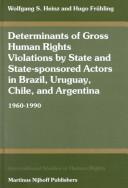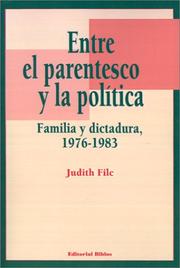| Listing 1 - 10 of 84 | << page >> |
Sort by
|
Book
ISBN: 9780190058104 0190058102 Year: 2022 Publisher: New York, NY Oxford University Press
Abstract | Keywords | Export | Availability | Bookmark
 Loading...
Loading...Choose an application
- Reference Manager
- EndNote
- RefWorks (Direct export to RefWorks)
The life and legacy of a young Argentinian woman whose disappearance in 1976 haunts those she left behindMarc Raboy always felt a "subliminal interest" in Argentina. His grandfather had left his village in the Ukraine in 1908 as a young man and spent a year in Buenos Aires, before returning home, marrying, and then emigrating to Canada, where Raboy was raised. While planning a trip of his own to Argentina, Raboy did an Internet search of his surname there, on the off-chance that he might discover some tie to his grandfather.In the process he found Alicia Raboy. Her story immediately seized him and wouldn't let him go. In June 1976, Alicia, a journalist and member of a militant underground leftwing group, the Montoneros, was ambushed by a security death squad while driving with her family in the city of Mendoza. Alicia's partner, the celebrated poet and fellow Montonero Francisco "Paco" Urondo, was killed on the spot. Their 11-month-old daughter, Ángela, was taken and placed in an orphanage. Her daughter ultimately was rescued; Alicia was never heard from again.In Looking for Alicia, Raboy pursues her story not simply to learn what happened when the post-Perón government in Argentina turned to state terror, but to understand what drove Alicia and others to risk their lives to oppose it. Whatever their distant ancestral kinship, author and subject were born a month apart, sharing not only a surname but youthful rebellion, journalistic ambition, and the radical politics that were a hallmark of the 1960s everywhere. Their destinies diverged through a combination of choice and circumstance.Using family archives, interviews with those who knew Alicia, and transcripts from the 2011 trial of former Argentine security forces personnel involved in her disappearance, Raboy reassembles Alicia's story. He supplements his narrative with documents from Argentina's attempts to deal with the legacy of the military dictatorship, such as the 1984 report of the National Commission on the Disappearance of Persons, Nunca Más ("Never Again"), as well as secret diplomatic correspondence recently made public through the U.S. State Department's Argentina Declassification Project. Looking for Alicia immerses readers in these dark years, which, decades later, cast their shadow still. It puts an unforgettably human face to the many thousands who disappeared, those they left behind, and the haunting power of the memories that bind us all to them. (Provided by publisher) "A chill overtook me as I absorbed the details of Alicia's story. Alicia and Paco were members of a revolutionary organization, the Montoneros, Argentina's most consequential urban guerrilla group of the 1970s. I remembered that when news of Argentina's desaparecidos -- the disappeared -- began to be reported, I occasionally wondered what my fate might have been had my grandfather remained in Argentina. Here, on the screen before me, was one possible answer to that question. Like so many of my generation, I had been involved in political activism, to a degree. I was never a member of any revolutionary organization but I knew people who were, and in Argentina that would have been enough. Argentina in the 1970s turned out to be a deadly place for youthful idealism. As many as 30,000 people, mostly in their 20s, were killed or "disappeared" (which became a verb during this era) between 1975 and 1983 in what Argentinians commonly refer to today as the period of terrorismo de Estado -- State Terrorism"--
Disappeared persons --- Victims of state-sponsored terrorism
Book
ISBN: 9789985909683 Year: 2007 Publisher: Tallinn Eesti Represseeritute Registri Büroo
Abstract | Keywords | Export | Availability | Bookmark
 Loading...
Loading...Choose an application
- Reference Manager
- EndNote
- RefWorks (Direct export to RefWorks)
Deportation --- Political persecution --- Political prisoners --- Victims of state-sponsored terrorism
Book
Year: 2018 Publisher: [Washington, D.C.] : [U.S. Government Publishing Office],
Abstract | Keywords | Export | Availability | Bookmark
 Loading...
Loading...Choose an application
- Reference Manager
- EndNote
- RefWorks (Direct export to RefWorks)
Victims of state-sponsored terrorism --- Americans --- Legal status, laws, etc.
Book
ISBN: 9781479874590 1479874590 9781479861576 147986157X 9781479829927 1479829927 Year: 2017 Publisher: New York : New York University Press,
Abstract | Keywords | Export | Availability | Bookmark
 Loading...
Loading...Choose an application
- Reference Manager
- EndNote
- RefWorks (Direct export to RefWorks)
Honorable Mention, 2019 Distinguished Book Award, given by the Sex & Gender Section of the American Sociological Association Honorable Mention, 2019 Marysa Navarro Book Prize, given by the New England Council of Latin American Studies (NECLAS)A profound reflection on state violence and women’s survivalIn the 1970s and early 80s, military and security forces in Argentina hunted down, tortured, imprisoned, and in many cases, murdered political activists, student organizers, labor unionists, leftist guerrillas, and other people branded “subversives.” This period was characterized by massive human rights violations, including forced disappearances committed in the name of national security. State terror left a deep scar on contemporary Argentina, but for many survivors and even the nation itself, talking about this dark period in recent history has been difficult, and at times taboo. For women who endured countless forms of physical, sexual, and emotional violence in clandestine detention centers, the impetus to keep quiet about certain aspects of captivity has been particularly strong. In Surviving State Terror, Barbara Sutton draws upon a wealth of oral testimonies to place women’s bodies and voices at the center of the analysis of state terror. The book showcases poignant stories of women’s survival and resistance, disinterring accounts that have yet to be fully heard, grappled with, and understood. With a focus on the body as a key theme, Sutton explores various instances of violence toward women, such as sexual abuse and torture at the hands of state officials. Yet she also uses these narratives to explore why some types of social suffering and certain women’s voices are heard more than others, and how this can be rectified in our own practices of understanding and witnessing trauma. In doing so, Sutton urges us to pay heed to women survivors’ political voices, activist experiences, and visions for social change.Recounting not only women’s traumatic experiences, but also emphasizing their historical and political agency, Surviving State Terror is a profound reflection on state violence, social suffering, and human resilience—both personal and collective.
Women --- Victims of state-sponsored terrorism --- Crimes against
Book
ISBN: 0190058129 0190058110 Year: 2022 Publisher: New York, New York : Oxford University Press,
Abstract | Keywords | Export | Availability | Bookmark
 Loading...
Loading...Choose an application
- Reference Manager
- EndNote
- RefWorks (Direct export to RefWorks)
The biography of a radical young idealist, her determination to make a difference in the world, and her disappearance in 1976, revealing the human cost and undying legacy of Argentina's descent into rightwing madness.
Disappeared persons --- Disappeared persons. --- Victims of state-sponsored terrorism.
Book
ISBN: 9789569766275 Year: 2018 Publisher: Santiago de Chile, Chile : Literatura Random House,
Abstract | Keywords | Export | Availability | Bookmark
 Loading...
Loading...Choose an application
- Reference Manager
- EndNote
- RefWorks (Direct export to RefWorks)
"En plena dictadura chilena, un angustiado hombre llega a las oficinas de una revista de oposición. Es un agente de la policía secreta. Quiero hablar, dice, y una periodista prende su grabadora para escuchar un testimonio que abrirá las puertas de una dimensión hasta entonces desconocida. Siguiendo la hebra de esta escena real, Nona Fernández activa los mecanismos de la imaginación para acceder a aquellos rincones donde la memoria y los archivos no han podido llegar. ... Las historias de La dimensión desconocida, dice la narradora, 'siempre han estado pisándome los talones. Nací con ellas incorporadas en un álbum familiar que no elegí ni organicé.' Como en un episodio de aquella vieja serie televisiva, Nona Fernández construye un relato a partir de la mala conciencia de un personaje insondable, exponiendo e iluminando esa zona de locura y extravío que está mucho más cerca de lo que pensamos y que puede hacer de un ser humano una bestia."--Back cover. "In the midst of the Chilean dictatorship, an anguished man arrives at the office of an opposition journal. He is an agent of the secret police. He wants to talk, he says, and a reporter takes her recorder to listen to a testimony that will open the doors to a previously unknown dimension. Following the thread of this real scene, Nona Fernández activates the workings of the imagination to access those corners that memory and archives haven't been able to reach. ... The stories in La dimensión desconocida [The Unknown Dimension], says the narrator, 'have always been right on my heels. I was born with them integrated into a family album that I neither chose nor organized.' Like in an episode of that old television series, Nona Fernández constructs a tale starting from the bad conscience of an unfathomable character, exposing and illuminating that zone of madness and deviance that is much closer than we think and that can make a human being into a beast."--Back cover; cataloger's translation.
State-sponsored terrorism --- State-sponsored terrorism. --- Torturers --- Torturers. --- Victims of state-sponsored terrorism --- Victims of state-sponsored terrorism. --- 1900-1999. --- Chile --- Chile. --- History

ISBN: 9041112022 900448180X Year: 1999 Volume: 59 Publisher: The Hague Boston London Martinus Nijhoff Publishers
Abstract | Keywords | Export | Availability | Bookmark
 Loading...
Loading...Choose an application
- Reference Manager
- EndNote
- RefWorks (Direct export to RefWorks)
Human rights --- State-sponsored terrorism --- Victims of state-sponsored terrorism --- Brazil --- Uruguay --- Chile --- Argentina
Book
ISBN: 9780520079656 0520079655 Year: 1993 Publisher: Berkeley: University of California press,
Abstract | Keywords | Export | Availability | Bookmark
 Loading...
Loading...Choose an application
- Reference Manager
- EndNote
- RefWorks (Direct export to RefWorks)
Mayas --- Indians of Central America --- Victims of state-sponsored terrorism --- Human rights --- Guatemala
Book
Year: 2007 Publisher: [Bujumbura]: RCN justice et démocratie,
Abstract | Keywords | Export | Availability | Bookmark
 Loading...
Loading...Choose an application
- Reference Manager
- EndNote
- RefWorks (Direct export to RefWorks)
Civil war --- War victims --- Victims of state-sponsored terrorism --- Human rights --- Burundi

ISBN: 950786136X 9789507861369 Year: 1997 Publisher: Buenos Aires: Biblos,
Abstract | Keywords | Export | Availability | Bookmark
 Loading...
Loading...Choose an application
- Reference Manager
- EndNote
- RefWorks (Direct export to RefWorks)
Families --- Family policy --- Victims of state-sponsored terrorism --- Families in literature --- Argentina
| Listing 1 - 10 of 84 | << page >> |
Sort by
|

 Search
Search Feedback
Feedback About UniCat
About UniCat  Help
Help News
News